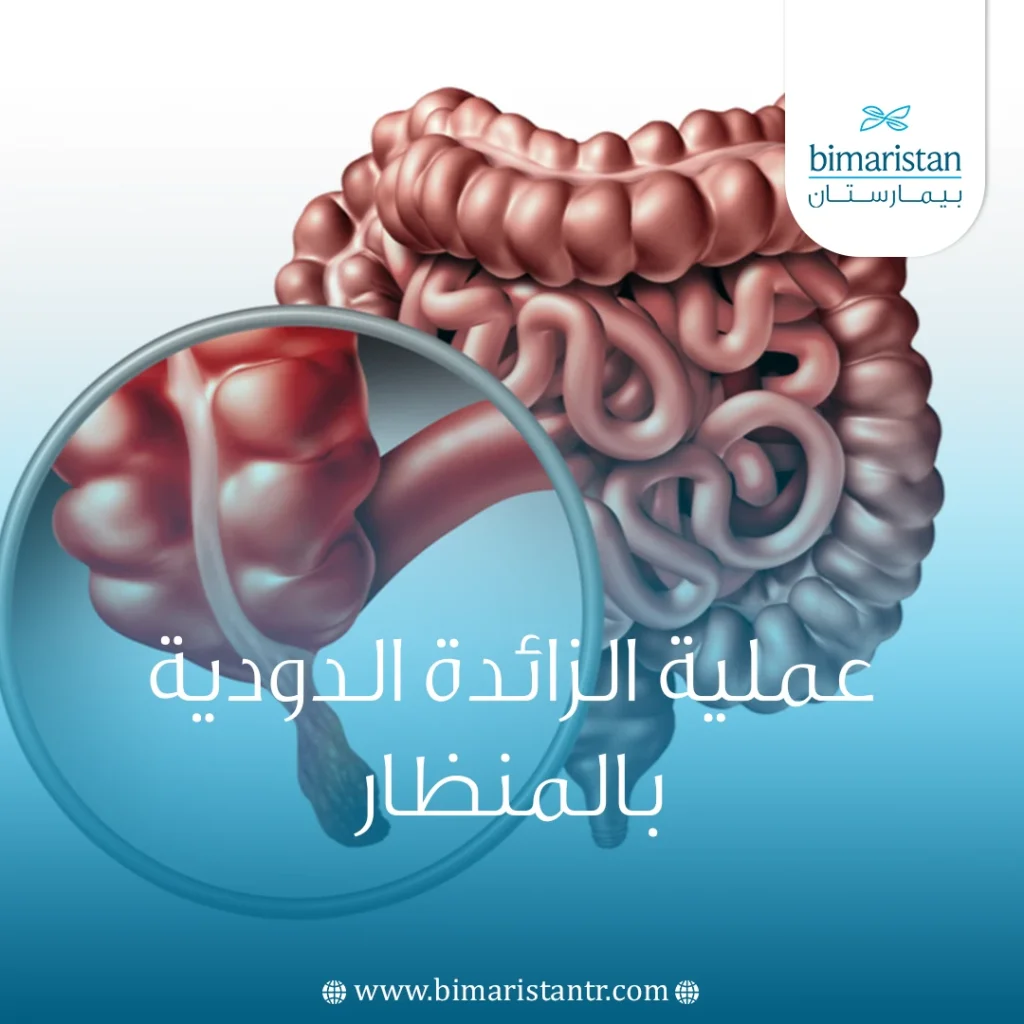عملية الزائدة الدودية بالمنظار من العمليات التي تجري بوتيرة كبيرة في تركيا، تتم عملية استئصال الزائدة الدودية بالمنظار لإزالة الزائدة الملتهبة منعاً لانفجارها.
لمحة عن عملية الزائدة الدودية بالمنظار
تتميز عملية الزائدة بالمنظار (laparoscopic appendectomy) بكونها الخيار الأفضل والأسرع في إزالة الزائدة الدودية، حيث يعد التهاب الزائدة الدودية من الحالات الشائعة كثيرة الانتشار بين الشباب.
يجب عدم تأخير العملية عند حدوث التهاب في الزائدة الدودية لأن الالتهاب قد يتطور ويؤدي لانتفاخ الزائدة وانفجارها لذا غالباً ما يتم إجراء العملية بشكل إسعافي.
يتم علاج التهاب الزائدة الدودية عبر إجراء عملية جراحية لاستئصال الزايدة بشكل كامل، يمكن أن يتم اجراء عملية استئصال الزائدة عبر الجراحة التقليدية المفتوحة أو عبر استخدام المنظار.
تُجرى عملية الزائدة الدودية بالمنظار بواسطة منظار مخصص يتم إدخاله للبطن عبر عمل شقوق جراحية صغيرة، يحوي المنظار على كاميرا صغيرة تمكن الطبيب من رؤية بطنك من الداخل والحصول على رؤية واضحة للزائدة.
يجهز المنظار أيضاً بأدوات جِراحية تساعد الجراح على استئصال الزائدة من خلال النظر إلى شاشة الفيديو وتوجيه تلك الأدوات بالشكل الصحيح.
إن التعافي من عملية الزائدة الدودية بالمنظار يستغرق وقتاً قصيراً بالمقارنة مع استئصال الزائدة بالجراحة المفتوحة، بالإضافة إلى أن خطر إحداث مضاعفات يكون أقل ولا تترك العملية ندبات جراحية واضحة خلفها.
ما هي الزائدة الدودية ومتى يجب استئصالها؟
تقع الزائده الدودية في الجزء السفلي الأيمن من البطن، ولها شكل أنبوب رفيع بحجم الإصبع وهي على اتصال مع الأمعاء الغليظة وتحديداً مع القولون الايمن الصاعد.
ما تزال وظيفة الزائدة الدودية غير معروفة لنا بشكل واضح، تم إيجاد عدد من الفرضيات حول وظيفتها المحتملة في جسم الإنسان لكنها تبقى مجرد فرضيات غير مثبتة تماماً.
يبقى من المعلوم لنا أن التهاب الزائدة الدودية هو أمر خطير ويجب التعامل معه بشكل عاجل خوفاً من انفجار الزائدة وانتشار البكتيريا ضمن البطن والتسبُب بما يسمى التهاب البريتوان الذي لهُ تأثيرات خطيرة مهددة لحياة المريض.
عند قدوم الشخص بشكاية ألم حاد بأسفل البطن من الجهة اليمنى يشتبه الطبيب بالتهاب الزائدة الدودية ويقوم بطلب فحوصات حتى يتأكد من وجود التهاب بالزائدة كالتصوير بالأمواج فوق الصوتية أو الفحوصات الدموية.
عندما يتم التأكد من حصول التهاب بالزائدة يجب عندها التحضير بشكل فوري لإجراء عملية الزائدة الدودية بالمنظار أو عن بطريقة الجراحة المفتوحة.

كيفية إجراء عملية الزائدة الدودية بالمنظار في تركيا
يتم أولاً إجراء تخدير عام للمريض ثم يقوم الطبيب بعمل عدة شقوق صغيرة بمنطقة البطن ليتم بعدها إدخَال المنظار من خلال إحدى الشقوق.
يجري أيضاً ادخال الادوات اللازمة لإتمام عملية استئصال الزائدة من خلال الشقوق الجراحية التي تم عملها مسبقاً، يتم توجيه الادوات بدقة عبر شاشة فيديو متصلة بكاميرا المنظار.
توضع قنية تعمل على تحرير غاز ثاني أوكسيد الكربون حيث يعمل على نفخ البطن لإتاحة رؤية أفضل للجراح وتسهيل رؤية الزائدة الدودية.
عندما يتم العثور على الزائدة الملتهبة يلجأ الطبيب لربطها بمجموعة من غرز جراحية ليتم استئصال الزائدة بِشكل كامل من خلال الشق الجراحي.
أخيراً يزيل الطبيب المنظار والأدوات التي إدخالها ويتم تضميد وخياطة الشقوق التي تم عملها مسبقاً.
يمكث المريض بالمستشفى بعد العملية لكي يتم التأكد من نجاح الإجراء وخلو عملية استئصال الزائدة الدودية بالمنظار من أية اختلاطات واردة الحدوث.
لطلب تفاصيل أكثر عن عملية الزائدة الدودية يمكنك التواصل معنا، نعمل نحن في مركز بيمارستان الطبي على إرشادك لأفضل المشافي المتخصصة في تركيا.

التحضير قبل عملية الزائدة الدودية بالمنظار في تركيا
بعد التخطيط لاجراء جراحة استئصال الزائدة الدودية، يجري عادةً التحضير للعملية عبر ما يلي:
- سيقوم طبيبك المختص بسؤالك عن الأدوية التي تتعاطها فقد يطلب منك الطبيب إيقاف بعض الادوية أو تعديلها قبل أو بعد العملية
- أخبر طبيبك بأية أمراض تعاني منها أو في حال الإصابة بسوابق مرضية تحسسية
- يفضل تجنب الطعام أو الشراب قبل إجراء العملية بمدة يحددها لك الطَبيب
- ابتعد عن التدخين قبل إجراء العملية وبعدها لأن التدخين قد يؤخر من عملية الشفاء والتعافي
- غالباً ما يلجأ الجرََاح إلى وصف المضادات الحيوية للمريض قبل العملية وذلك للتقليل من خطر انتقال العدوى
التعافي بعد عملية الزائدة الدودية بالمنظار
بعد الانتهاء من العملية يبقى الشخص تحت المراقبة لعدة ساعات قبل السماح له بالعودة إلى المنزل، يحرص الكادر الطبي على مراقبة العلامات الحيوية كضربات القلب ومعدل التنفس تحسباً لحدوث اختلاطات لعملية استئصال الزائدة الدودية.
في معظم الأحيان يمكنك العودة إلى منزلك بعد مضي يوم واحد أو يومين من إجراء العملية ويمكن أن تعود للقيام بنشاطاتك اليومية بعد مدة تقدر بـ حوالي 1 إلى 3 أسابيع من الجراحة.
إن المدة اللازمة للتعافي بشكل كامل من العملية تختلف من شخص لآخر، حيث تعتمد على عدة أمور كالحالة الصحية للمريض وكيفية استجابة الجسم للعملية الجراحية.
سنقدم لك بضعة نصائح لتسريع عملية التعافي بعد عملية الزائدة الدودية بالمنظار:
- اتبع تعليمات الطبيب فيما يخص النظام الغذائي بعد العملية
- ابتعد عن النشاطات المتعبة أثناء فترة التعافي من عملية الزائدة
- تجنب القيادة لمدة 24 ساعة على الاقل بعد الجراحة بسبب التأثيرات المحتملة للتخدير المستخدم بالعملية
- في حال قمت بملاحظة تغيرات جديدة كاحمرار في منطقة البطن أو ارتفاع بالحرارة قم بمراجعة الطبيب
مزايا عملية الزائدة الدودية بالمنظار في تركيا
وفقاً للدراسات تتميز عملية استئصال الزائدة التي يتم إجراؤها باستخدام المنظار عن عملية الزائدة بالجراحة التقليدية بما يلي:
- فترة تعافي أقصر
- طفيفة التوغل وأكثر أمناً مع احتمال قليل لحدوث اختلاطات
- الألم أخف مما هو عليه في جراحة الزائدة التقليدية
- الندبات الجراحية الناتجة عن العملية صغيرة
المضاعفات المحتمة عن عملية الزائدة الدودية بالمنظار
في الواقع تعتبر عملية الزائدة الدودية التي تجرى باستخدام المناظير آمنة لحدٍ كبير لكن لا يخلو إي إجراء جراحي من مخاطر محتملة، نذكر بعض الاختلاطات الوارد حدوثها من عملية الزائدة الدودية بالمنظار:
- النزف
- إنتان (عدوى) مكان شق الجراحة أو انتشار العدوى بالبطن
- إصابة عضو مجاور
- تشكُل نواسير
- المشاكل المتعلقة بالتخدير كالشعور بالغثيان

